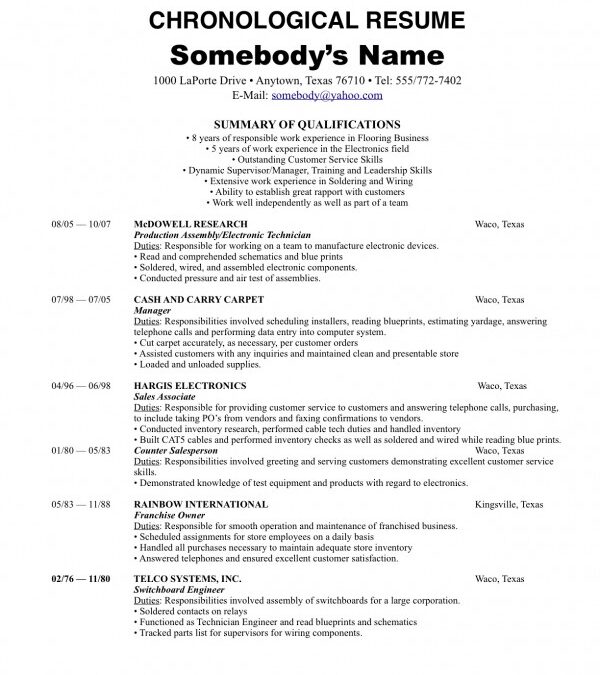
by cjxpadmin | Jul 1, 2012 | August 2012 Magazine
WHAT IS THE RESUME FORMAT FOR YOU?
A personal marketing package is a personʼs first introduction to a prospective employer. Therefore, it must make a great presentation. It should be accurate, neat, attractive, error-free and as professional as one wants to be perceived. This article provides the job seeker with the methodology for preparing a professional looking and sounding package that is representative of oneʼs background and skills.
The next important decision to be made for your resume is which format will work best for you? Which resume can encompass all your experience, skills and abilities and put them in the best light? We are going to go through three different types of resumes:
> Chronological,
> Functional, and
> Combination.
Once youʼve determined what kind of resume format you want to use, you will need to gather your employment information, education information, skills, accomplishments and references and prepare them for presentation.
Regardless of which format you decide is right for you, be sure and create a Summary of Qualifications at the very top of the resume. This Summary of Qualifications needs to include your most valuable information with regard to education, experience, skills, abilities and accomplishments. Also include some personal traits and characteristics. In most cases, employers have approximately 15-20 seconds to review resumes due to the large number of resumes that they get. With all your important information in your Summary, the employer can review this in that small amount of time and if he/she sees something that intrigues them in your summary, then, they will be compelled to read your resume in more detail. However, if you do not put anything interesting in your Summary, they will just lay your resume aside.
The chronological resume format will list your work history, with the most recent position first. Your jobs will then be listed in reverse chronological order. In other words, you will list your current or most recent job first. Then you list the rest of your jobs in the same order, most recent jobs first. Ordinarily, employers like to see this type of resume because it is quite simple for them to see what jobs you have held and how long you have worked there. The chronological resume format works best for those job seekers who have a strong and solid work history with no breaks between jobs. The following is an example of a chronological resume format.
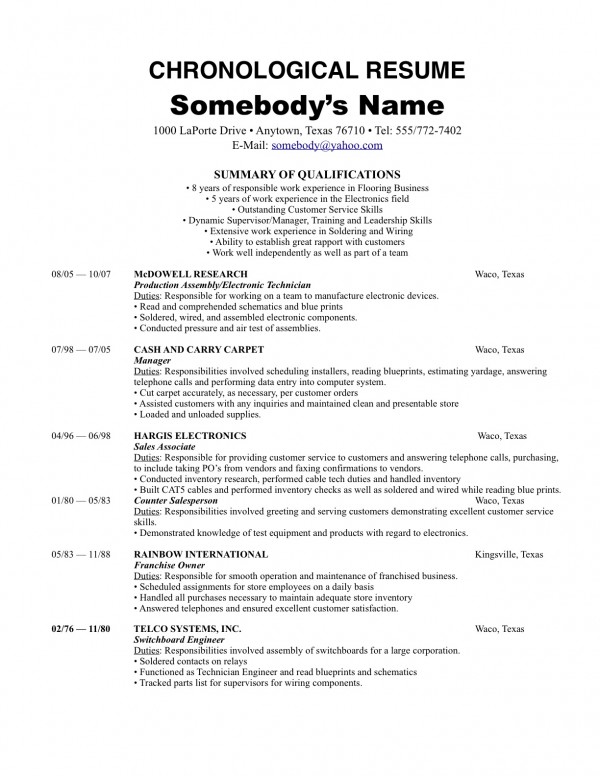
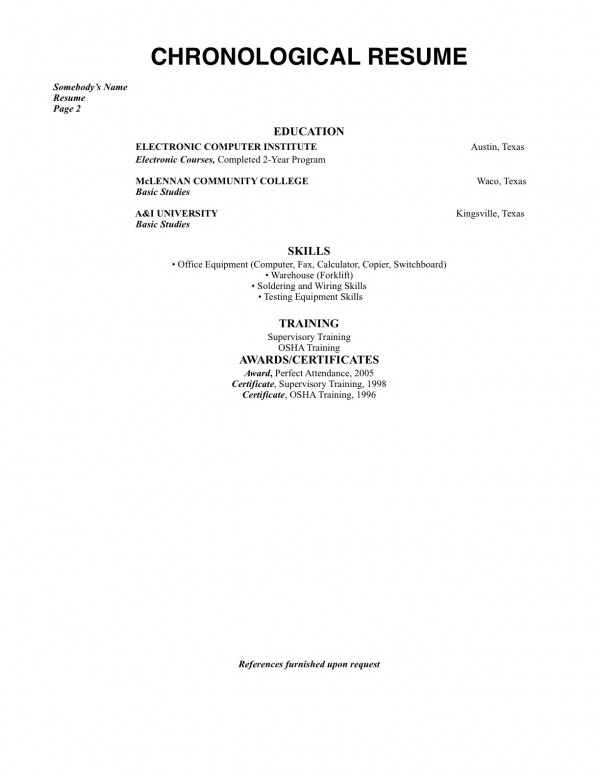
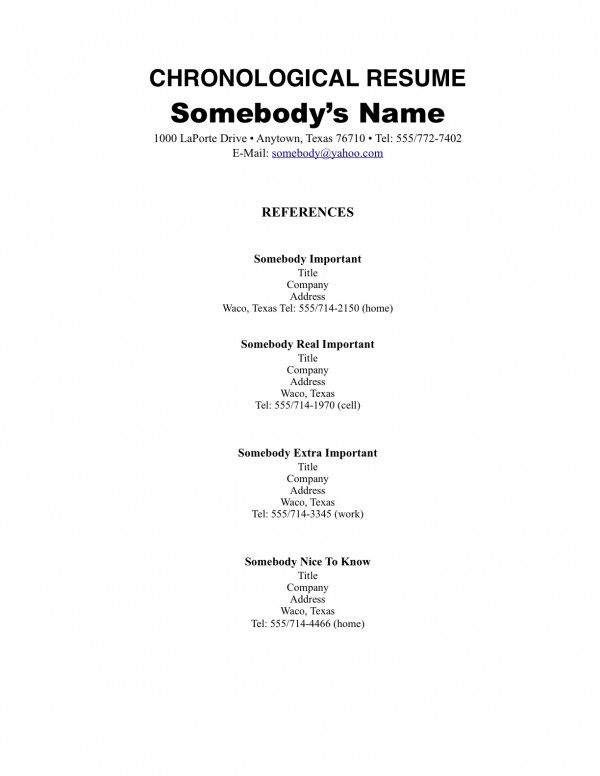
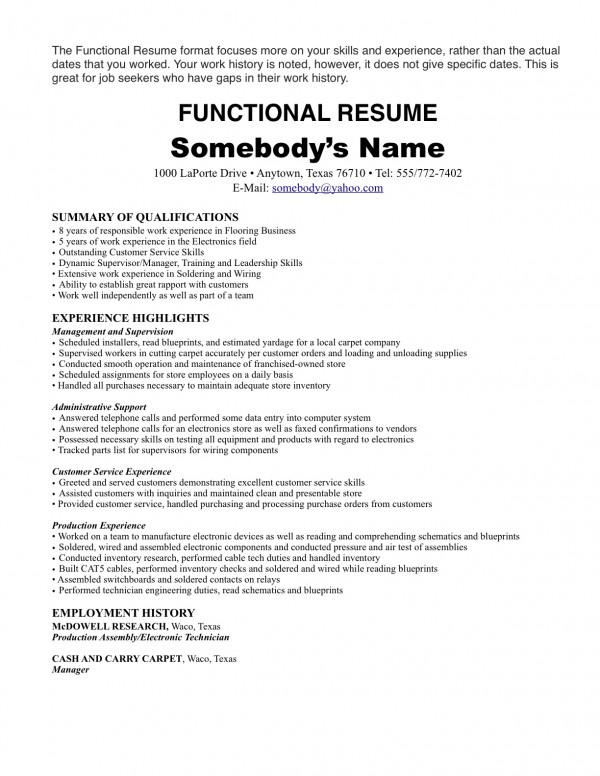
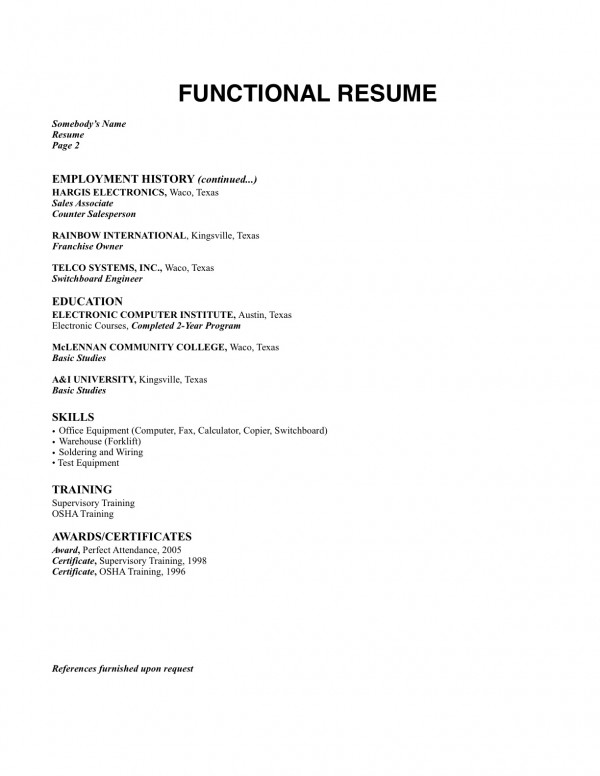
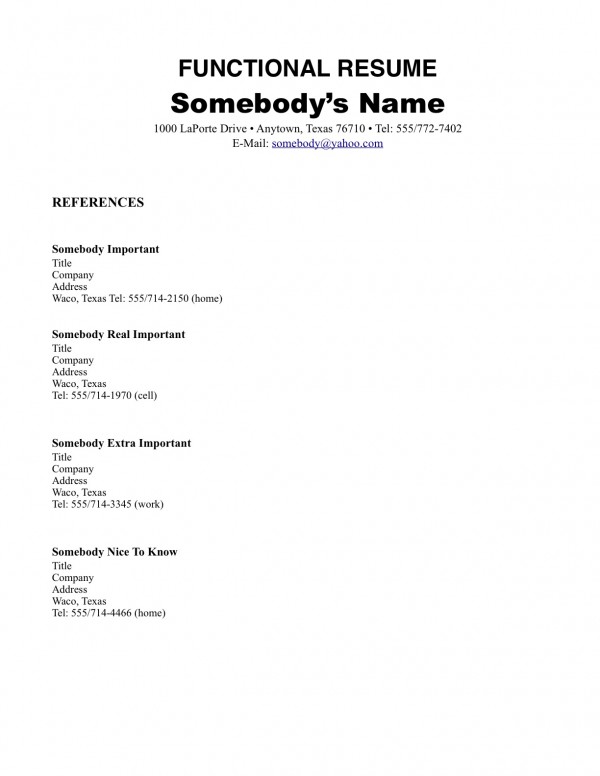
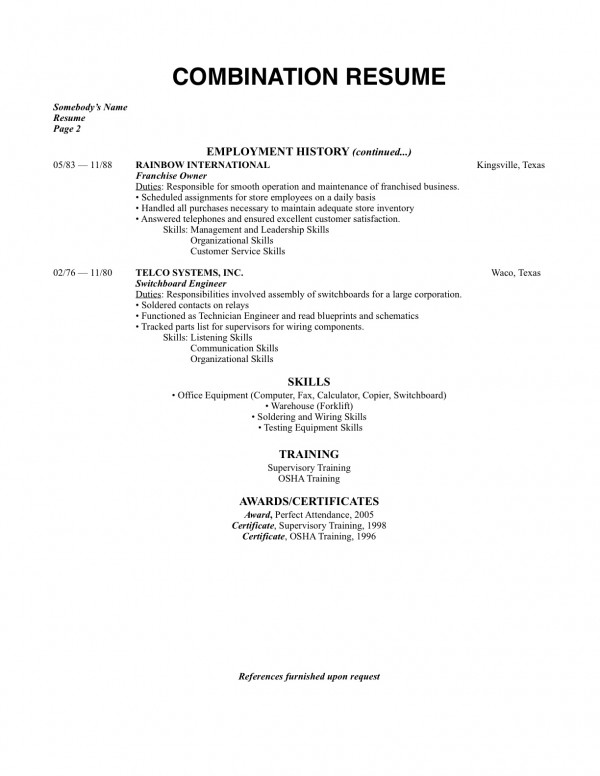
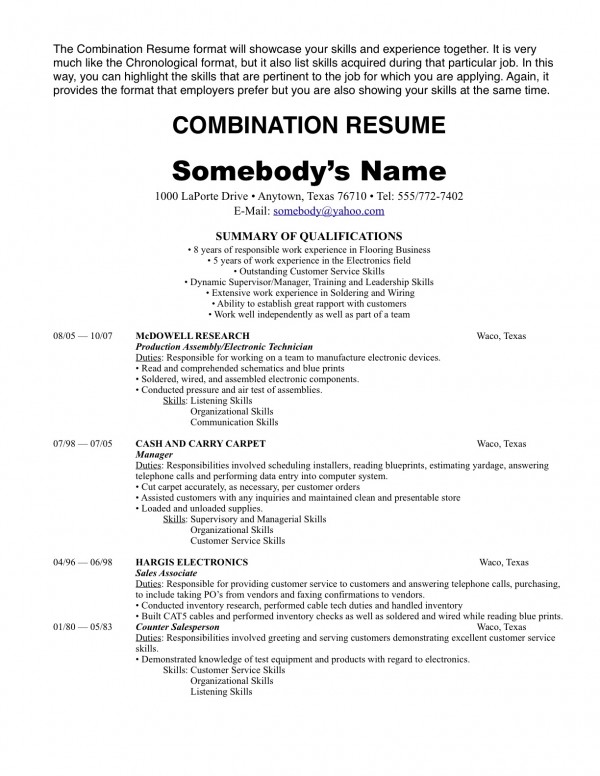
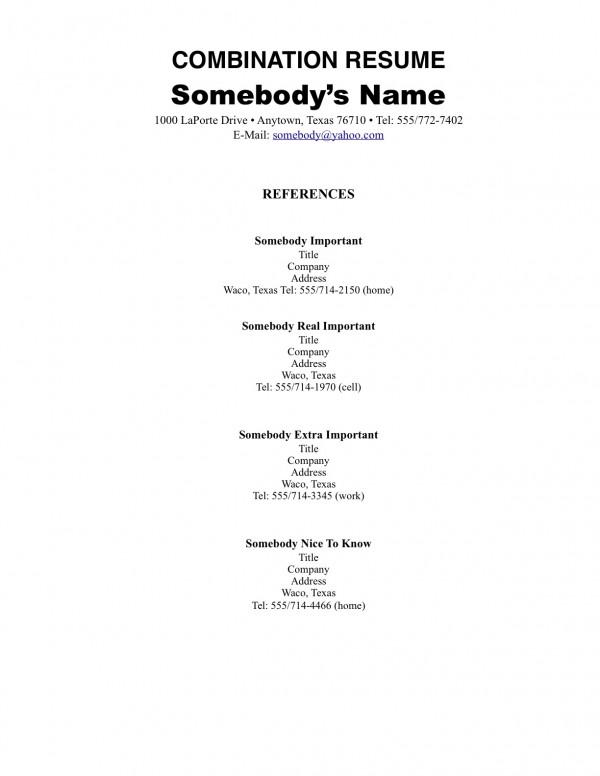
I hope this has helped you decide which resume format works for you. If one of these three formats does not work for you, you may also want to check out these other types.
Some of those are:
Targeted Resume — This is a resume that is customized to fit the qualifications and requirements of a particular job. It may take you a little more time to prepare it, but it could well be worth it if you are targeting a particular job, one that fits your pertinent skills and experience.
Mini Resume — A mini resume is very much like the Summary of Qualifications on your regular resume. This can be used when you are networking or when someone requests a summary of your qualifications and accomplishments.
Non-traditional Resume — A non-traditional resume is a web-based version of your resume that may include your photo or certain graphics, images, pictures of various things and maybe even a video.
Good luck in determining the best resume format for you!
by cjxpadmin | May 14, 2012 | Job Readiness/Search Videos, Spanish Videos, Videos
[jwplayer file=”/video/Interviewing-Spanish-1.m4v” image=”https://workforcepmg.com/images/wpmg-frame.jpg”]

by cjxpadmin | May 1, 2012 | Job Readiness, May 2012 Magazine
Preparing To Write Your Resume
Before you write a single word on your resume, you must consider what you want to say. We will get to the proper resume format and the recommended order of presentation in future articles. But first to get started, you must gather your thoughts and carefully consider what are the most important things about yourself you want any employer to know. The employer(s) you are applying to  will want to know that you have both specific qualifications as well as general qualifications they are looking for in a good candidate. It is up to you to prepare a presentation of yourself that will detail why you are an excellent candidate for the job you want and the job they are posting.
will want to know that you have both specific qualifications as well as general qualifications they are looking for in a good candidate. It is up to you to prepare a presentation of yourself that will detail why you are an excellent candidate for the job you want and the job they are posting.
All employers will want to know about your work experience, both your work experience directly related to the job you are after and your overall work experience in general. You want to give the employer a sense that you are an experienced employee, you know what it means to work successfully, and that you have the ability to learn and prove yourself to be an excellent employee.
Answer this first question as completely as you can.
Describe your previous three jobs, for each job describe…
• where did you work?
• when did you start?
• when did you end working there?
• what was your job title?
• what were your duties?
• what knowledge did you have to have to do that job?
• what tools, machines, equipment or technology did you use?
• Were you ever praised, rewarded, recognized for the job you did?
Employers want to know that you have skills that will valuable on the job. Make a list of all the skills you can think of that you possess. You can pick and choose later which ones are most relevant but for now make a huge list of your skills. This step will also help you prepare for interviews. The types of skills you have may include computer skills, math skills, money handling skills, organizational skills, customer service, sales and more. The more skills you have, the more value you have as an employee. Think about it and make the biggest list you can.
Employers want to know that you are smart, knowledgeable and interested in learning. Make a list of all the classes, courses, trainings, workshops, any and all education you have attained that shows both that you know a lot and that you are a successful learner. Consider the classes in school that are related to the work you want. Also include all that you have been taught on jobs and from the people who have shared their know-how with you. You will include your formal education on your resume, but it can be very impressive to carefully pick and show specific knowledge and education you have relevant to the job you are seeking.
Lastly, employers will want to know about any additional qualities, accomplishments, abilities, and knowledge that you can bring to a job. Outside of what you have already listed, prepare an overview of everything you can think of that an employer might find impressive. Think of awards, volunteer experience, school accomplishments, any and everything that would give an employer an impression that you are someone special.
Once you have collected, prepared and written all of this detail, you will have a fortune to draw from in putting together a great resume specific to the job you want. Do this prep work first and we will address how to put it together in our next article.
Now it’s your turn: start collecting your information and remember the harder you work, the luckier you get.
Norm Sternfeld, The Resume Wiz
△

by cjxpadmin | May 1, 2012 | Job Search, May 2012 Magazine, This Issue's FEATURE, Uncategorized
INITIATIVE
What is the definition of initiative? Well, when you’re talking about a personal nature such as social settings, it would be an introductory act or step, leading action, such as it would take initiative to make friends. In other settings, it could mean readiness and ability in initiating action, something enterprising or adventurous. Now when you are talking about your own personal self,  you would take responsibility, make a decision or bottom line, to act on one’s own initiative. Well, that’s what Webster says.
you would take responsibility, make a decision or bottom line, to act on one’s own initiative. Well, that’s what Webster says.
Take the Initiative. In life, you will never feel the exhilaration of doing something fun or adventurous or maybe even a little dangerous. Do you dare? Sometimes, you have to take the initiative to go beyond what you feel is safe. Why do we do this? Because it’s life guys, okay? There are many things out there that maybe haven’t touched your life yet, but you will never know this if you don’t take the initiative.
Initiative at Work. The same holds true in your work and your career. If you are working somewhere in an entry level position and a position comes up that could help you move up the ladder, so to speak, would you apply for it? Well, who wouldn’t, right?  Sure, but you need to take the initiative to make that happen. I will tell you a story about a good friend of mine who was in this very same situation. He has been working at the same entry level position at this big corporation for over a year. He is a very hard worker and a very conscientious person, but yet, he is still in that entry level position. So what did he do? He took the initiative. He saw his chance to do something different in his everyday process of working, so he spoke up about how something could be done differently. His supervisor took notice and has now asked him to apply for an upcoming position with the company, not as a temporary worker which he currently is, but as a permanent employee — with benefits! YAY! That’s a good feeling. And this all came about because he took the initiative.
Sure, but you need to take the initiative to make that happen. I will tell you a story about a good friend of mine who was in this very same situation. He has been working at the same entry level position at this big corporation for over a year. He is a very hard worker and a very conscientious person, but yet, he is still in that entry level position. So what did he do? He took the initiative. He saw his chance to do something different in his everyday process of working, so he spoke up about how something could be done differently. His supervisor took notice and has now asked him to apply for an upcoming position with the company, not as a temporary worker which he currently is, but as a permanent employee — with benefits! YAY! That’s a good feeling. And this all came about because he took the initiative.
So, when on your job, taking the initiative simply means that you will go beyond your job title or duties to get something done. On any job, as you grow in the job and as you gain more experience and know-how, higher-ups expect you to show initiative. They want you to be able to be more flexible, have answers to
problems or even initiate a new procedure to save time or money, like my friend did on his job.
Here are a few tips for you to show initiative:
- Always keep yourself busy. When you have completed your duties, find something else to do to make the job situation better. Take on extra duties if you can.
- Establish a good rapport with your supervisor and with his superiors.
- Think up ways to improve your work environment.
- If you see something that is being done wrong or inefficiently, bring a suggestion forward.
- Volunteer to help with work-related committees or company fundraisers.

- Always, always keep your mind open to change.
So, look around you. What change can you make? In anything? Home, school, work, personal, anything? Just set your mind to something you want to change and make it happen. It’s in your control.


△

by cjxpadmin | May 1, 2012 | Job Readiness, May 2012 Magazine, This Issue's FEATURE, Uncategorized
ILLEGAL INTERVIEW QUESTIONS
Have you ever been to an interview and you were asked certain questions and in your mind, you wondered, “Was that question legal?” “Should I answer that or object?” Well, it happens to a lot of people. There are various situations where you may be asked questions that could go either way. There are, however, some questions that are illegal and we are getting ready to cover that right now. Pay attention to the Example Tables because they will show you some good examples of some of those illegal questions and then it will give you possible alternatives, legally speaking.
AGE? DATE OF BIRTH?
Age-based inquiries should be avoided because state law prohibits discrimination against persons age 40 and older. An age inquiry may be made to ensure a person is “old enough” to work for the job being filled, or if the job is among the few where age discrimination is permitted such as physically dangerous or hazardous work or driving a school bus.
| Example of Illegal Questions |
Possible Legal Alternatives |
| How old are you? |
Are you over the age of 18? |
| When is your birthday? |
Can you, after employment, provide proof of age? |
| In what year were you born? |
|
| In what year did you graduate from college/high school? |
|
MARITAL/FAMILY STATUS
(often alludes to sexual orientation)
The purpose of these “family” inquiries is to explore what some employers believe is a common source of absenteeism and tardiness. Typically, these questions are asked only of women making the inquiry clearly unlawful. However, even if such inquiries are made of both men and women, the questions may still be suspect. Such information has been used to discriminate against women because of society’s general presumption that they are the primary care givers. If the employer’s concern is regular work attendance, a better question would be, “Is there anything that would interfere with regular attendance at work?”
| Example of Illegal Questions |
Possible Legal Alternatives |
Are you married?  |
Would you be willing to re-locate, if necessary? |
| Do you have a permanent partner? |
Travel is an important part of the job. Do you have any restrictions on your ability to travel? |
| With whom do you live? |
Do you have responsibilities or commitments that will prevent you from meeting specified work schedules? |
| How many children do you have? |
 |
Are you pregnant? |
Do you anticipate any absences from work on a regular basis? If so, please explain the circumstances? |
| Do you expect to have a family? When? How many children will you have? |
|
| What are your child care arrangements? |
|
PERSONAL
Minimum height and weight requirements are unlawful if they screen out a disproportionate number of women or minorities. Unless the employer can show that a height or weight requirement is essential for job performance, such inquiries should be avoided.
Questions about height and weight are always illegal unless it can be proven that there are minimum requirements to do the job.
| Example of Illegal Questions |
Possible Legal Alternatives |
| How tall are you? |
|
| How much do you weigh? |
Are you able to lift a 50-pound weight and carry it 100 yards, as that is part of the job? |
|
 |
DISABILITIES
Inquiries about a person’s disability, health or worker’s compensation histories are unlawful if they imply or express a limitation based on disability. Under the federal Americans with Disabilities Act, any inquiry at the pre-employment stage, which would likely require an applicant to disclose a disability, is unlawful. Employers must avoid such inquiries or medical examinations before making a bona fide job offer.
However, an employer may inquire about an applicant’s ability to perform certain job functions and, within certain limits, may conduct tests of all applicants to determine if they can perform essential job functions, with or without an accommodation.
| Example of Illegal Questions |
Possible Legal Alternatives |
| Do you have any disabilities? |
Are you able to perform the essential functions of this job with or without reasonable accommodations? (This is a legalquestion if the interviewer thoroughly described the job.) |
| Have you had any recent illness or operations |
Will you be able to carry out in a safe manner all job assignments necessary for this position? |
| Please complete the medical questionnaire. |
Are you able to lift a 50-pound weight and carry it 100 yards, as that is part of the job? |
| What was the date of your last physical exam? |
NB: Medical exams are legal AFTER an offer has been extended; results should be held strictly confidential except for reasons of safety. |
| How’s your family’s health? |
|
| When did you lose your eyesight/leg/hearing/etc? |
|
NATIONAL ORIGIN/CITIZENSHIP
Inquiries about a person’s citizenship or country of birth are unlawful and imply discrimination on the basis of national origin. A lawfully immigrated alien may not be discriminated against on the basis of citizenship. The Immigration Reform and Control Act of 1986 require employers to verify the legal status and right to work of all new hires. Employers should not ask applicants to state their national origin, but should ask if they have a legal right to work in America, and explain that verification of that right must be submitted after the decision to hire has been made. To satisfy verification requirements, employers should ask all new hires for documents establishing both identity and work authorization.
| Example of Illegal Questions |
Possible Legal Alternatives |
| Where were you/your parents born? |
Do you have any language abilities that would be helpful in doing this job? (Legal, if language ability is directly relevant to job performance.) |
| What is your native language? |
Are you authorized to work in the United States? |
| What is your country of citizenship? |
 |
| Are you a U.S. citizen? |
|
ARREST RECORD
There are laws that prohibits inquiries about past arrest records but permits consideration of a current arrest. If an applicant is under arrest for an offense that is substantially related to the job, an employer may suspend judgment until the case is resolved, advises the applicant to reapply when the charge is resolved, or refuse to employ the applicant. A current employee who is arrested may be suspended if the charge is substantially related to the job.
An employer may not refuse to employ or discharge a person with a conviction record unless the circumstances of the conviction substantially relate to the circumstances of the job. If an inquiry about convictions is made, the employer should add a clarifier, “A conviction will not necessarily disqualify you from employment. It will be considered only as it may relate to the job you are seeking”. Anyone who evaluates conviction record information should be knowledgeable about how such data may be used.
| Example of Illegal Questions |
Possible Legal Alternatives |
| Have you ever been arrested? |
Have you ever been convicted of ____ crime? (Legal, if the crime is reasonably relevant to the job; e.g. embezzlement for a banking job.) |
|
 |
|
|
AFFILIATIONS
| Example of Illegal Questions |
Possible Legal Alternatives |
| What clubs or social organizations do you belong to? |
List any professional or trade groups or other organizations that you belong to that you consider relevant to your ability to perform this job. |
RACE/COLOR/RELIGION
This question may discourage an applicant whose religion prohibits Saturday or Sunday work. If a question about weekend work is asked, the employer should indicate that a reasonable effort is made to accommodate religious beliefs or practices. An employer is not required to make an accommodation if doing so would create an undue hardship on the business.
| Example of Illegal Questions |
Possible Legal Alternatives |
| All questions are illegal. |
Are you available for work on Saturday and Sunday? |












 will want to know that you have both specific qualifications as well as general qualifications they are looking for in a good candidate. It is up to you to prepare a presentation of yourself that will detail why you are an excellent candidate for the job you want and the job they are posting.
will want to know that you have both specific qualifications as well as general qualifications they are looking for in a good candidate. It is up to you to prepare a presentation of yourself that will detail why you are an excellent candidate for the job you want and the job they are posting.

 you would take responsibility, make a decision or bottom line, to act on one’s own initiative. Well, that’s what Webster says.
you would take responsibility, make a decision or bottom line, to act on one’s own initiative. Well, that’s what Webster says. Sure, but you need to take the initiative to make that happen. I will tell you a story about a good friend of mine who was in this very same situation. He has been working at the same entry level position at this big corporation for over a year. He is a very hard worker and a very conscientious person, but yet, he is still in that entry level position. So what did he do? He took the initiative. He saw his chance to do something different in his everyday process of working, so he spoke up about how something could be done differently. His supervisor took notice and has now asked him to apply for an upcoming position with the company, not as a temporary worker which he currently is, but as a permanent employee — with benefits! YAY! That’s a good feeling. And this all came about because he took the initiative.
Sure, but you need to take the initiative to make that happen. I will tell you a story about a good friend of mine who was in this very same situation. He has been working at the same entry level position at this big corporation for over a year. He is a very hard worker and a very conscientious person, but yet, he is still in that entry level position. So what did he do? He took the initiative. He saw his chance to do something different in his everyday process of working, so he spoke up about how something could be done differently. His supervisor took notice and has now asked him to apply for an upcoming position with the company, not as a temporary worker which he currently is, but as a permanent employee — with benefits! YAY! That’s a good feeling. And this all came about because he took the initiative.









